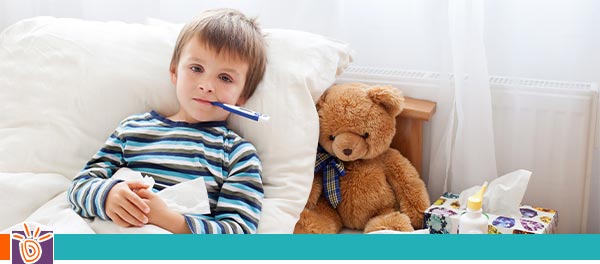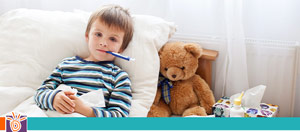Common Winter Illnesses in Children and How to Prevent Them?
Winter is a peak period for children to fall ill. They are more likely to catch and spread contagious illnesses since they spend more time indoors with other people. Common winter illnesses include flu and respiratory infections that often cause symptoms like coughing, sneezing, fever, and fatigue. If your child shows these symptoms, seek medical care immediately. At KidsHealth Pediatrics, Dr. Maria Nabong and her expert team of pediatric specialists are available to provide personalized guidance and care, maintaining your child’s health and well-being even during the coldest months. For more information, contact us or schedule an appointment online. We have 2 pediatric clinics in Scottsdale and Glendale, AZ.




Table of Contents:
Do kids get sick because of cold weather?
Why do kids get sick often in winter?
What illnesses do kids get in winter?
How can the common cold be prevented and treated?
Cold weather by itself doesn’t directly cause illness in children, but it can make them more susceptible to catching viruses. When the body is exposed to cold weather, it constricts blood vessels to conserve heat and maintain a stable body temperature. This may weaken the immune system, making it easier for children to catch colds, the flu, and other respiratory illnesses.
Usually, when it’s cold outside, children tend to be indoors, where the air is dry and circulated, facilitating the spread of germs. This, coupled with the fact that they are in close proximity to others, increases the likelihood of picking up an infection. Viruses that cause colds and flu can spread through droplets in the air when someone with the virus coughs or sneezes or by direct contact with contaminated surfaces.
To reduce the risk of sickness during the colder months, it’s important to encourage good handwashing habits and ensure that children are dressed appropriately for the weather. Proper clothing, including warm coats, hats, gloves, and scarves, can help keep the body warm and reduce the risk of exposure to cold temperatures, which can weaken the immune system and make children more vulnerable to the sickness.
There are several reasons why kids tend to get sick more often in the winter. The cold weather itself doesn’t cause illness, but it can weaken the immune system, making it a lot harder for the body to fight off infections.
Many winter activities, such as playing in the snow or skating on ice, can expose children to cold temperatures, increasing the likelihood of catching a cold or flu. To reduce the risk of illness during the winter months, it’s important to encourage good handwashing habits, ensure that children are dressed appropriately for the weather, and avoid close contact with others who may be sick.
Kids can get various illnesses in the winter, but the most common ones are colds and flu. These are caused by viruses that are transferred from person to person through the air or by touching contaminated surfaces. Symptoms of a cold could include a runny or stuffy nose, a sore throat, a cough, and a headache. Flu symptoms are usually more severe and may include fever, fatigue, body aches, and chills.
In addition to colds and flu, kids may also get other respiratory infections such as bronchiolitis, croup, and pneumonia. These illnesses are caused by various viruses and bacteria that affect the lungs and airways. Symptoms of these illnesses may include coughing, wheezing, difficulty breathing, and fever.
Other winter illnesses that kids may get include gastroenteritis (stomach flu), which is characterized by vomiting and diarrhea, and strep throat, which is caused by a bacterial infection and may cause a sore throat, fever, and difficulty swallowing. To reduce the risk of illness during the winter months, it’s important to encourage good handwashing habits, ensure that children are dressed appropriately for the weather, and avoid close contact with others who may be sick.
Preventing the common cold can be challenging, but there are some preventable measures that can reduce the risk of catching it. To help prevent the spread of germs that may cause colds, children should be taught to wash their hands often with soap and warm water, specifically before eating or touching their faces. They should also avoid close contact with people who are sick and cover their mouth and nose when coughing or sneezing.
In terms of treatment, there is no cure for the common cold. However, there are some things that can be done to ease the symptoms, such as getting plenty of rest, staying hydrated, and taking over-the-counter pain relievers to relieve fevers and headaches. Nasal saline drops or sprays may be used to relieve nasal congestion. Cough drops or cough syrup may help relieve coughing.
Most colds resolve on their own within a week or so. If a child’s symptoms persist or worsen—they have difficulty breathing, develop a fever, or have other severe symptoms—it’s important to get some medical attention.
In the winter, young children may be vulnerable to illnesses. If you are worried about your child’s health in the winter, visit our pediatricians at KidsHealth Pediatrics, where we provide proper treatment and discuss why illnesses occur and what parents can do to prevent them. For more information, contact us or schedule an appointment online. We have 2 pediatric clinics in Scottsdale and Glendale, AZ. We serve patients from Glendale AZ, Peoria AZ, Sun City AZ, Scottsdale AZ, North Scottsdale AZ, Grayhawk AZ, and surrounding areas of Phoenix AZ.

Additional Services You May Need

Additional Services You May Need









